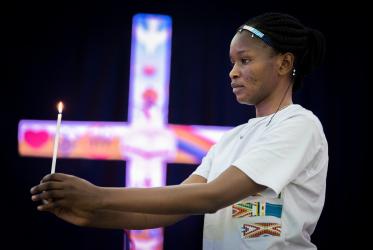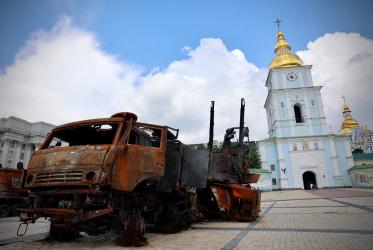“What happens when we journey on a pilgrimage, a pilgrimage of justice and peace, with people who share our values but who may or may not accept the institution of the church? And what does it mean to be on a pilgrimage of justice and peace, when the next generation shares our concerns for justice and peace, and want to follow God, but do not share our spirituality as confined by church and by tradition?”
It is mid-September, and Prof. Dr Isabel Apawo Phiri, World Council of Churches (WCC) associate general secretary, is keynote speaker at a WCC consultation in Coatbridge, Scotland, on the theme “Spirituality, worship and mission: Searching for ecumenical spirituality of the pilgrimage of justice and peace”.
Christians from around the globe gathered in Coatbridge on 19-24 September, for days of Biblical reflections, sharing of experiences, prayers and working together. Rev. Dr Ester Pudjo Widiasih, WCC programme executive for spiritual life, explains, “We have gathered for this consultation based on a need to find a working definition of the spirituality, or spiritualities, of the pilgrimage of justice and peace, inspired by the WCC Commission on World Mission and Evangelism’s document Together Towards Life. But more than just looking for an ecumenical spirituality, we explore in particular the idea of transformative spirituality.”
“Pilgrimage, especially a Christian pilgrimage of justice and peace, is a question of walking, of changing, of moving,” says Br Guido Dotti from the Monastic Community of Bose, Italy. “The identity of each Christian, of each human being, is something that is shaped every day, by confronting ourselves with others, with those who walk with us on part of our pilgrimage, with those who cross our road, and with the word of God. If we pretend to save our identity from the beginning of the pilgrimage until the end, then we miss the goal of the pilgrimage.”
Ester Widiasih continues, “I believe the meaning of the pilgrimage of justice and peace is togetherness, is walking, working and praying together. As church, I feel we need to reconsider the common attitude that we are always giving, giving to those at the margins, to those who are poor, for example. And often, the people who are at the margins are not actually included in our conversation. Instead, on the pilgrimage of justice and peace we want to be working with them, and to challenge the idea that they do not have something to give back to us.”
“When we talk about mission from the margins”, says WCC programme executive for Mission and Evangelism Dr Katalina Tahaafe-Williams, who reported to the consultation on the spiritualities of indigenous peoples, “we are talking about groups that are usually excluded. So when it comes to the pilgrimage of justice and peace, it is essential that we include the voices of marginalized groups, such as indigenous peoples, because they are resources, they bring experiences and practices, and ways of being and ways of living, that would really help inform what spirituality should be, for all of God’s people.”
Rev. Dr Martin Johnstone, pilgrimage leader and secretary of Church and Society Council in the Church of Scotland, adds, “I think often when we think of how we take our spirituality to the margins, we think of taking something from the centre, and bringing it to the margins. But if we are to discover a different type of spirituality, I believe we need to recognize the spirituality of the people who are at the margins. I think that that is often a spirituality of fragility, where we recognize our strength in our vulnerability, in our weakness. And instead of that being a problem, it can be a way of following Jesus, the Jesus who chose fragility over strength.”
Ester Widiasih concludes, “what I think is important that we take away from this consultation, is the hope of defining a spirituality that gives life, that moves away from self-centredness, and the separation of spirituality from our daily lives. Even though spirituality is in some ways personal, it must not only be something between me and God. Instead, I hope we can find a spirituality that is also communal, and that connects with the web of life.”
WCC Pilgrimage of Justice and Peace
Spirituality and worship in ecumenical context
Ecumenical perspectives on mission and unity
Together towards Life: Mission and Evangelism in Changing Landscapes









